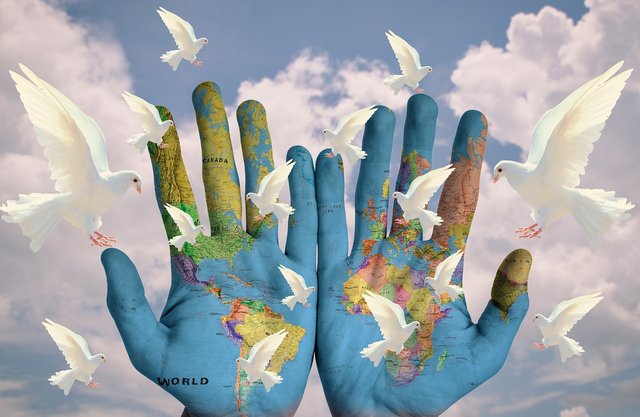Peace Is Possible

It’s Martin Luther King Jr. Day in the US, and I want to talk about peace.
With the high levels of social/political conflict and polarization these days, peace is what we all need. It’s also what most of us want, although there are different ideas about what it means and how to create it.
Some believe peace can only come through control and domination of what they fear – for example, one ethnic group discriminating against or trying to wipe out another, or building a big-ass wall to try to keep them away.
The problem is, it takes effort and energy to control things. Vigilance and diligence. It’s expensive and exhausting. In other words, it produces the opposite of peace – constant wariness and agitation.
What you try to control ends up controlling you.
True peace has to involve respect and the recognition that no one has the right to impose their way of life on another or harm them for their own gain. Peace can only grow from the recognition that we are all human, and that we are all better off when everyone gets their needs met. On the flipside, we all suffer when any of us suffers.
While we need some sense of normalcy, stability, and security, we also need variety and uncertainty. Too much sameness leads to stagnation.
Too much routine becomes boring and unfulfilling. Too much of one way of living and experiencing the world limits our options and lowers our intelligence and creativity.
This is part of why travel is so transformative. Wherever you go, there you are, but who you are changes through going to different places and experiencing different environments, cultures, and lifestyles. Possibilities open up, new ways of thinking emerge – the recognition that there is no one way things have to be, and that we can therefore change the way things are.
We live in a world of so much potential for cross-cultural connection, through both physical travel and communication technology. We have access to each other in ways we could barely imagine a few decades ago. We have the opportunity, on a mass scale, to really get that people are people are people – we want love, belonging, the right to exist and to have our basic needs met.
Yet so many are still bought into the age-old notions of separateness and the need to feel superior.
Supremacy is the belief that one type of person is superior to and has the right to hurt or dominate another type – that might makes right. It’s an outgrowth of some of the more primitive aspects of our wiring that value survival above all else. It’s good to survive, but when we view everything different from us as a threat we must obliterate, it’s a detriment to who we are, or could be, as a species.
As psychologist Stan Tatkin writes in his excellent book Wired For Love, “Unfortunately, the parts of our brain that are good at keeping us from being killed are also quite stupid. ‘Shoot first, ask questions later’ is the basic credo.”
Tatkin refers to these parts of our brain as ‘primitives.’ They suck at relationships, love, and peace. But we have other parts that are all about connection and communication, which he calls Ambassadors.
Tatkin’s book is primarily about love relationships, but the implications for society as a whole and relations between different groups of people are also profound.
We have a choice. Our lives and society don’t have to be ruled by fear and the need to control or dominate others.
The things we have in common can bring us together, and our differences can give us that much more life to experience and enjoy.
If you agree, great. How can you act on this more?
What can you do to build bridges, connect with people that are different from you, and cultivate peaceful and mutually beneficial interactions?
What can you do to root out any unconscious fears or prejudices about people that are different from you?
If you don’t agree and have some grudge or judgment against some group of people, I challenge you to have a polite conversation with one of them for 10 minutes. Odds are, you will find out that what you thought you knew about them was completely wrong.
Don’t believe it? Check out this true story of a black man named Daryl Davis, who befriended over 200 of KKK members, resulting in their leaving the organization.
Peace is possible. We need to pull together, despite our fears. We need to recognize that the real threat to our existence is not the existence of some group that seems different. The real threat is the fear itself, and all the misery and destruction it produces.
Violence causes more violence. Hate causes more hate. If we want a world of peace, we’re going to have to work for it, face our fears, recognize our false assumptions, and be willing to change.
Note: this post also appears on davidkirshbaum.com and medium.com